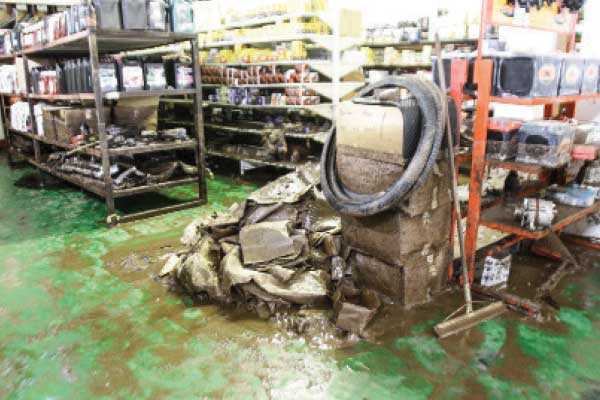Moshupa residents pick the pieces after raging floods
Many people in Moshupa are still working around the clock to get their lives back together following recent floods in the village. Householders, business people and travellers suffered disruptions after Taushele dam in Lotlhakane West, reportedly collapsed following heavy rainfall. This has raised fresh concerns that not enough is being spent on flood defences and prevention measures.
Before opening Clap Your Hands Laundry five years ago, on the banks of Mosopa River, businesswoman, Kefilwe Dibotso (37) knew that the river sometimes overflows. But never in her wildest dreams did she ever expect flooding to blow the busiest street in Moshupa to near total-destruction. On Saturday afternoon, Dibotso helplessly watched as trash bins and all sorts of junk floated on top of her store. She had closed around 2 p.m as waters began to rise in the river. “I started this business from scratch with just one washing machine and dryer. It was my whole livelihood, how will I feed my children,” lamented the mother of two.
Dibotso, whose small business employs two people, says five washing machines, three dryers and four steam irons were destroyed. The only thing that remains is one standard iron. “Right now, I’m totally overwhelmed. Peoples’ clothes are ruined, I don’t know when or even how I’m going to rebuild my business,” she said.Chin Yiu who also owns one of the many shops affected, says the weekend events reminded him of Tsunamis and floods back at his home country. “I am Chinese and I have seen the aftermath of floods and tsunamis. This reminds me of that. It is a disaster. I’m shocked,” he said.
Botswana Guardian caught up with Yiu on Monday morning, who together with his employees, swiftly moved whatever they could salvage from the shop, as he feared the walls would cave in. “I have lost a little over a hundred thousand worth of stock,” he revealed.
Tebogo Kgasa (49) is one of the many who also watched helplessly as her home and property got destroyed in chest-deep water. “I lost everything and it’s hard to talk because it’s still very emotional, when you lose everything, it hurts,” said the unemployed mother of three who sold chickens from her small poultry in her yard.
“I lost my chickens, all 120 of them plus the 65 I had already slaughtered just waiting to be delivered to customers. Just thinking about it brings tears to my eyes,” she said, explaining that the water came very fast and very strong.
“We tried to scramble and stuff what we could in suitcases but it was already too late. Everything in the house is ruined.” She says it was very hard when they came back on Saturday. “Although things were floating around, you couldn’t see a lot of the mess, because it was submerged. Now you can see everything, and it’s horrible; absolutely horrible.”
In truth, pictures can barely do justice to the scale of the destruction. What used to be Kgasa’s warm, tidy home now resembles a rubbish heap, piled high with ruined household appliances, rotting food, sodden clothes, and filthy children’s toys.
Every single item of wooden furniture has either been completely smashed to pieces by the force of the water that poured into the house or it just disintegrates when one tries to lift it. Sofas, stove, and the kitchen fridge have been toppled over. A layer of mud now covers almost every horizontal surface, from a dirty high-water-mark downward to curtains and cushions that are still damp.
Kitchen units are bent out of shape. There is no mains water, or electricity. “My family has lived here since 1970 I have never seen it as bad as that. We have had a bit of flooding where the water has spilled out the river but never where it came to our houses,” said Kgasa.
Next door to her house, the roof of a newly built three-bedroom house was completely destroyed. Another neighbour, a stone’s throw away, had their boundary wall broken down by the sheer force of the water. “It was the scariest experience of my life,” said 67-year-old Margret Masemola. “If my children were not around to whisk me away to safety, I shudder to think of what could have happened to me”. Masemola is currently sleeping at her elder son’s home in Gaborone. Now, after putting in more than 12 hours of work everyday since the fateful day, she is starting to see the damage turn back into the place she once called home. With the hard work her family is putting in, she hopes to be back to her house in no time.
At least five houses were badly affected by the floods, says Assistant District Commissioner, Tshepho Kgotso. “We have managed to secure accommodation for two families from their relatives while the third is accommodated at Kgabophuti Primary School.
We are organising groceries for the affected families,” he said, pleading with the public to exercise compassion and lend a helping hand in whatever way possible.Many residents in the village blame the poor drainage system and the poor workmanship of the newly constructed culverts for compounding the disaster.
“They are too high up and small, the water was not able to escape through,” Kgasa opined. About two weeks earlier, during the festive holidays, Hatsalatladi River Bridge that connects Thamaga, Moshupa and Kanye on the A10 road collapsed, resulting in two vehicles falling into the river.






